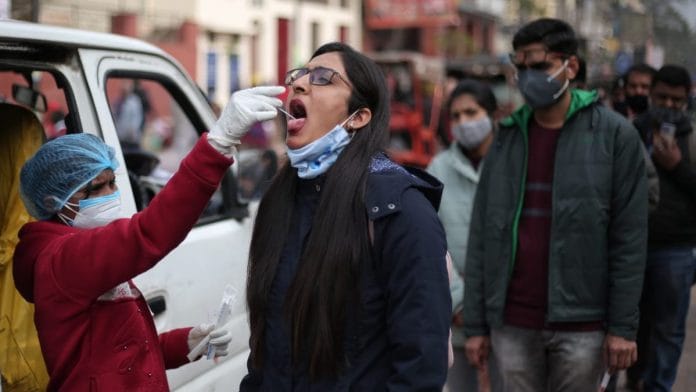New Delhi: As hospitals across the country reel under increasing Covid infections among healthcare workers, the new testing guidelines of the Indian Council of Medical Research (ICMR), notified Monday, have raised concerns in the medical fraternity. Many doctors fear the guidelines could not only set the stage for more infections among medical staff, but also cause worse surgical outcomes among patients with undiagnosed Covid.
The latest testing strategy — changed for the first time since September 2020 — states: “Asymptomatic patients undergoing surgical/non-surgical invasive procedures, including pregnant women in/near labour who are hospitalised for delivery, should not be tested unless warranted or symptoms develop.”
Although this is subject to the “discretion” of the treating doctor, the guidelines have caused unease, especially at a time when many hospitals say that patients with Covid — who had been admitted to a hospital for some other treatment and had tested positive for Covid-19 during routine tests — outnumber patients who got admitted to hospital after developing complications following a Covid diagnosis.
The new guidelines have also waived testing for contacts of confirmed Covid-19 infected people unless they are in the ‘high-risk’ categories, based on age and comorbidities.
In a tweet Wednesday, Dr Anoop Misra, chairman, Fortis CDOC Hospital for Diabetes and Allied Sciences, and former professor of medicine, AIIMS New Delhi, called for the new order to be rescinded, noting “two issues” it stood to create.
Two issues:
1. Even if asymptomatic, surgical outcome in #Covid19 positive cases may be worse.
2. Possible infection of #anesthesia/#criticalcare team during/after op in such patient mean danger to #doctors/#HCW & further attrition of workforce.
This order should be rescinded https://t.co/EkbCUl3kP1
— anoop misra (@docanoopmisra) January 12, 2022
“Importance of pre-surgery testing for Covid-19 is manifold. It prevents dissemination of virus to the precious workforce of anaesthetists and critical care specialists, and likely prevents operation-related risky events which would not happen in Covid-19 negative patients,” Misra told ThePrint. “To my mind, all patients going for any surgery or invasive procedures should get tested for Covid-19.”
While there are no authentic figures available with the Union Ministry of Health and Family Welfare on infections among doctors, some reports suggest that over 750 doctors at six major Delhi hospitals are currently infected with the SARS-CoV-2 virus.
With staff infections surging, doctors at many government hospitals in Delhi have also called for a temporary hold on elective OPDs and non-essential treatment for patients with hernia, appendix-related issues, and other routine conditions.
Also read: Covid isolation cut to 7 days, no need for re-test — Govt’s new guidelines for home quarantine
‘A very strange exception’
Apart from patients in a hospital setting, ICMR’s “purposive testing strategy” also does away with testing requirements for a range of people, including asymptomatic individuals in community settings and contacts of confirmed cases of Covid-19, unless identified as high-risk based on age or comorbidities.
This essentially means that contact tracing according to the “test, track, treat” guidelines would change completely in the coming days.
Among the comorbidities listed in the document are diabetes, hypertension, chronic lung or kidney disease, malignancy and obesity.
That part of the document, says Dr Ambrish Mithal, chairman, Endocrinology and Diabetes, Max HealthCare, can be justified on an epidemiological rationale.
“You see, the way Omicron is spreading, not testing all contacts makes sense, because if we do that it will overwhelm testing capacity, though there are some other concerns about further spread in the vulnerable sections,” Mithal said.
“But what I find really bothersome, in fact I strongly disagree with, is about hospitals not testing people who get admitted. These would also be people undergoing invasive procedures under anaesthesia, with tubes etc being used, then there is the exposure of the staff and also these people would be surrounded by people who are unwell — that is why they are in a hospital,” Mithal added.
“What about the risk of a spread there? This is a very strange exception, even though they have said ‘discretion of the treating doctor’. Patients need to be tested for sure at the time of admission and if needed, once again before the procedure.”
A doctor at Indraprastha Apollo Hospital in Delhi, speaking to ThePrint on condition of anonymity, said: “For the present, we will continue to test all those who get admitted, either through admissions or emergency. With such high positivity (according to the Delhi government’s bulletin Tuesday, the test positivity rate stood at 25.65 per cent) and with many people being asymptomatic, as a matter of abundant precaution, we have decided to continue the tests.
“Nobody is stopping treatment or halting access to clinical care till the test results come in, but it is simply that knowing the Covid status of the patient helps us plan better clinically. Currently, we have about 80 healthcare workers who are positive, including around 30 doctors and 40 nurses.”
(Edited by Saikat Niyogi)
Also read: There’s a boom in DIY Covid tests — what are they and how do they work






